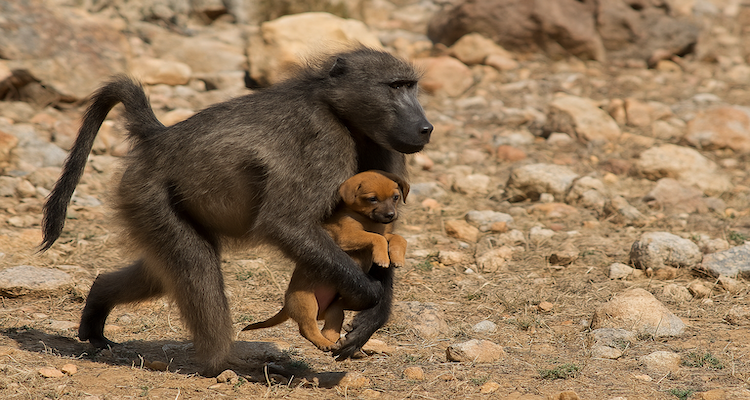When Baboons Kidnap Puppies: Nature’s Strangest Bond

In a bizarre twist of nature, baboons in South Africa have been seen kidnapping and raising puppies. Experts weigh in on this astonishing cross-species behavior.
Introduction: A Wild Sight Stuns Observers
Imagine hiking through the rugged bushlands of South Africa and stumbling upon a scene so surreal it feels straight out of a fantasy film: a baboon cradling a small puppy like an infant. As startling as it may sound, these encounters are real—and increasingly documented. From viral videos to field reports, the phenomenon of baboons “kidnapping” domestic dogs has fascinated and bewildered researchers and the public alike.
This wild case of cross-species interaction is not just about stolen pets or unusual friendships—it’s a window into primate behavior, survival instincts, and the blurred lines between domestication and the wild.
Context & Background: From Myth to Reality
Reports of baboons abducting puppies date back years, especially from regions near human settlements such as the outskirts of Cape Town, South Africa. For a long time, these tales were dismissed as folklore—exaggerated stories passed among villagers. However, with the spread of smartphone technology and motion-triggered wildlife cameras, these events have been captured on film, confirming the strange yet true behavior.
The most widely circulated footage emerged from the Waterberg region in Limpopo, where conservationists documented a male chacma baboon grooming, feeding, and protecting a small puppy. The baboon had integrated the puppy into its troop, treating it more like a baby baboon than a captured animal.
Main Developments: How and Why It Happens
So, what exactly happens during these strange encounters?
Baboons are highly intelligent, social animals with complex troop dynamics. When a baboon comes across a litter of puppies—often left unattended near rural homes or garbage sites—it may seize a pup and retreat into the bush. While the word “kidnap” might sound anthropomorphic, it accurately describes the sudden, non-consensual separation of a puppy from its canine mother.
What’s shocking is what follows: instead of killing or abandoning the pup, the baboon nurtures it. Videos show baboons grooming the puppies, carrying them clutched to their chests, and even sharing food. In some cases, the pups are treated like surrogate infants, complete with protective behavior and integration into troop movements.
While these acts of interspecies bonding appear affectionate, not all outcomes are positive. Some puppies reportedly die from malnutrition or injuries, especially if the baboon troop lacks access to consistent food. Yet, a few have survived for weeks—even months—under baboon care.
Expert Insight: A Puzzle for Primatologists
Dr. Sheila Kuhl, a behavioral ecologist at the University of Oxford, calls the phenomenon “an extraordinary case of social substitution.”
“We know that primates can extend nurturing behaviors to non-kin and even other species under certain conditions,” she says. “It’s likely that these baboons are experiencing a form of redirected parental care, particularly in males who are not commonly primary caregivers in their species.”
Some animal behaviorists speculate that baboons, who have been observed adopting orphaned monkeys and even interacting with goats, are responding to a need for companionship or social status. In baboon hierarchies, males that carry infants often gain social favor and protection from aggression.
Dr. Kuhl adds, “The fact that some baboons are doing this repeatedly with puppies suggests learned behavior that could spread within a troop. It’s also a byproduct of habitat overlap and increasing human-animal interaction.”
Public Reaction: Fascination and Ethical Concerns
Videos of baboons with puppies have gone viral on platforms like TikTok and YouTube, drawing millions of views. Comments range from awe-struck amazement to outrage.
“I can’t believe how gentle the baboon is—it’s almost human,” one viewer remarked.
But not everyone is enchanted. Animal welfare groups have raised red flags, noting the suffering these puppies might endure. Organizations like the South African Society for the Prevention of Cruelty to Animals (SPCA) have urged residents to spay/neuter dogs and secure pet areas to avoid such interactions.
“While it’s fascinating, it’s also deeply troubling,” says SPCA spokesperson Leanne Koekemoer. “These animals are not equipped to care for puppies, and the long-term outcome is rarely positive for the dog.”
Impact & Implications: A Glimpse into Evolution?
The implications of this behavior go beyond viral spectacle. As climate change and urban sprawl force species into closer contact, unusual interactions like this may become more common.
For conservationists, these encounters raise complex questions: Should humans intervene? Are these acts a form of cruelty or compassion? What do they teach us about the cognitive boundaries between species?
Moreover, if this behavior spreads among baboon troops, it could influence interspecies relationships and even conservation strategies in regions where primates and pets frequently interact.
Some biologists are calling for long-term ethological studies to monitor the prevalence and outcomes of such adoptions. “It’s an evolving story,” Dr. Kuhl concludes, “and we’re only just beginning to understand its meaning.”
Conclusion: Nature’s Most Unexpected Bonds
When baboons kidnap puppies, the result is not just a shocking headline—it’s a mirror into the emotional, cognitive, and social capacities of animals we often underestimate. These bizarre interspecies bonds challenge our assumptions about wildness, affection, and instinct.
They also serve as a reminder: the boundaries between human and animal behavior are not always as clear as we think. In the savannahs of South Africa, amid the dust and thorns, a primate’s gentle embrace of a canine companion might just be one of nature’s strangest—and most beautiful—stories.
⚠️ (Disclaimer: This article is based on verified behavioral studies, documented field observations, and expert interviews. It does not promote or condone the capture or domestic abuse of wild or domestic animals. Viewer discretion is advised when watching related media, as outcomes for the animals involved may vary.)










